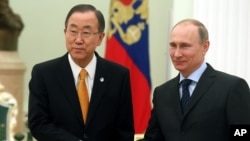MOSCOW —
Earlier at the Kremlin, U.N. Secretary-General Ban Ki-moon and Russian President Vladimir Putin exchanged formalities over the situation in Ukraine. Ban expressed “deep concern”. While Putin said he was “highly appreciative” of the secretary-general’s peacekeeping efforts, according to the Kremlin’s website.
Analyst Alexei Makarkin of the Center for Political Technologies said Ban was in a tough spot.
He said, moral arguments had little effect on Russian authorities and the secretary-general had nothing else to offer.
Meanwhile, Russia’s lower house of parliament, the Duma, ratified the treaty to incorporate Crimea and Sevastopol into Russia with an overwhelming majority. The treaty must still pass through the upper parliament to take effect.
Edward Lozansky, president of American University in Moscow, was not surprised. “It was to be expected. We know that only one brave individual, Leo Ponomarev voted against,” he said.
In relation to Crimea, Putin also signed a decree for preserving the rank of Ukrainian servicemen, police officers, and security service officers who choose to serve in their Russian counterpart structures. Makarkin saw it as a way to attract high-ranking officers.
He said for now only privates and low-rung officers were switching sides, people who already lived in Crimea. He believed most of the officers wanted to serve Ukraine.
Ukraine also renounced its 2014 chairmanship of the Commonwealth of Independent States, a loose union of former Soviet nations.
Makarkin commented the organization had no influence, saying it was just an instrument for civil divorce of former Soviet countries.
And certainly divorce between Russia and Ukraine is well underway.
Analyst Alexei Makarkin of the Center for Political Technologies said Ban was in a tough spot.
He said, moral arguments had little effect on Russian authorities and the secretary-general had nothing else to offer.
Meanwhile, Russia’s lower house of parliament, the Duma, ratified the treaty to incorporate Crimea and Sevastopol into Russia with an overwhelming majority. The treaty must still pass through the upper parliament to take effect.
Edward Lozansky, president of American University in Moscow, was not surprised. “It was to be expected. We know that only one brave individual, Leo Ponomarev voted against,” he said.
In relation to Crimea, Putin also signed a decree for preserving the rank of Ukrainian servicemen, police officers, and security service officers who choose to serve in their Russian counterpart structures. Makarkin saw it as a way to attract high-ranking officers.
He said for now only privates and low-rung officers were switching sides, people who already lived in Crimea. He believed most of the officers wanted to serve Ukraine.
Ukraine also renounced its 2014 chairmanship of the Commonwealth of Independent States, a loose union of former Soviet nations.
Makarkin commented the organization had no influence, saying it was just an instrument for civil divorce of former Soviet countries.
And certainly divorce between Russia and Ukraine is well underway.
